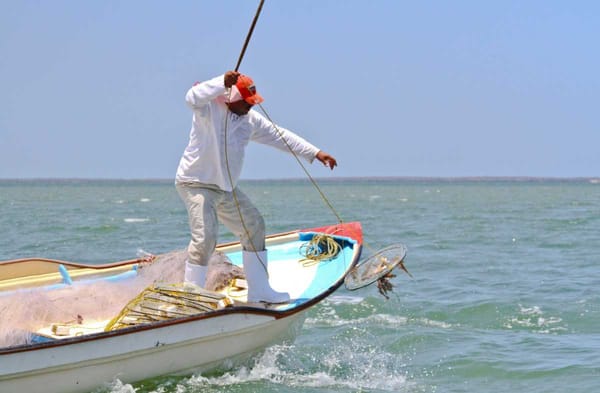AMLO Cracks Down on Corrupt Health Contracts
President AMLO's morning conference covered a wide range of topics, from salvaging archaeological treasures to investigating overpriced health bids. He vowed to fight corruption, protect the environment, and strengthen support for Mexican migrants.

In his trademark style, President Andrés Manuel López Obrador (AMLO) kicked off his morning conference bright and early today at 7:20 a.m. The charismatic leader wasted no time in sharing his vision for Mexico's future, boldly declaring that the country is destined to become one of the top 10 economic powerhouses in the world. According to AMLO, Mexico's current advantages for investment, development, and legal business make it incredibly attractive for foreign investors.
Shortly after AMLO's opening statement, Diego Prieto, the head of the National Institute of Anthropology and History (INAH), took the floor to provide an update on the archaeological salvage efforts in the southeast of the country. These efforts are part of the ambitious Mayan Train project, which aims to revitalize the region's infrastructure while preserving its historical treasures. Prieto revealed that all sections of the mega project have been approved for construction, with the focus now shifting to additional works. So far, the salvage teams have unearthed an impressive array of artifacts, including 52,751 immovable goods, over a million ceramic fragments, and 1,925 relatively intact movable goods. The restoration process is underway for 767 vessels, 612 bones, and 1,812 natural features such as caves and cenotes.
Transitioning to matters of citizen attention, AMLO acknowledged the importance of addressing the needs of the people. He mentioned that he would request a report from Gabriela Romero, the head of the Citizen Attention area, to gain insights into the daily requests pouring in from concerned citizens. AMLO emphasized that, under his administration, there have been remarkably fewer protests in Zócalo Square, demonstrating a general satisfaction among the populace. Nevertheless, he acknowledged the genuine needs of citizens and emphasized his commitment to satisfying those needs.
The President also touched on the well-being of Mexican migrants in the United States. He expressed satisfaction with the progress made in opening consulates to provide better support for countrymen and countrywomen abroad. Additionally, AMLO highlighted ongoing efforts to simplify the process of sending remittances from the U.S., with the Financiera para el Bienestar already distributing cards for this purpose. The President's dedication to enabling greater political participation for Mexican migrants was also evident, as he proposed streamlining their political-electoral involvement through electronic means during a recent meeting with the National Electoral Institute (INE) counselors.
Shifting gears, AMLO addressed concerns about overpriced bids within the health sector in the State of Mexico. He pledged that the Ministry of Finance would launch a thorough investigation into the matter. The President emphasized that corrupt contracts for selling medicines and medical equipment had plagued the government for years, benefiting only a select few. He revealed that three companies alone had made an exorbitant 60 billion pesos a year from selling medicines to the government. AMLO admitted that while progress had been made, there was still work to be done to eradicate such unfair practices.
Continuing his crusade against corruption, AMLO highlighted the fight against the system of "influence peddling" that existed before his administration. He proudly shared that his government's efforts had already saved approximately 40 million pesos by renegotiating contracts and reducing costs. To illustrate the waste of the previous system, the President presented a table showcasing exorbitant payments made to private companies for building and operating hospitals for up to 25 years. He stressed that these lavish agreements not only drained the budget but also hindered assistance to the most vulnerable populations.
With environmental concerns on his mind, AMLO applauded the integrity and dedication of Delfina Gómez, the governor-elect of the State of Mexico. He acknowledged the illegal logging problem in several Mexican states, including the State of Mexico, Morelos, Sinaloa, Durango, and Chihuahua. However, the President expressed confidence in Gómez's ability to rescue Mexican forests and stressed the importance of cultivating rather than destroying these precious resources.
In another infrastructure-related announcement, AMLO revealed an agreement with a Kansas construction company to promote a passenger train to Querétaro. The introduction of this train service aims to alleviate road traffic congestion, which will subsequently reduce accidents on the roads leading to Querétaro.
Turning his attention to workers' rights, AMLO disclosed that Pemex, Mexico's state-owned petroleum company, had implemented a basification program. This initiative seeks to ensure that employees receive the rights they deserve. The President thanked union leaders for their cooperation in correcting flaws within collective bargaining agreements, thus ensuring basifications are based on employee seniority and experience.
Addressing environmental concerns once more, AMLO criticized past inaction when hotel complexes and recreation sites caused environmental damage. He pointed out the lack of outcry when the Calica company was granted concessions to exploit the Mexican Caribbean coast. In response, the President pledged to convert the impacted zone into a Natural Protected Area (NPA), preserving at least 200 hectares for ecological tourism. He condemned the use of the Caribbean coast as a material bank, extracting gravel for construction projects and causing damage to archaeological sites. AMLO also highlighted the potential for establishing a cruise pier in the area, which would further boost tourism.
Turning to matters of public safety, the President expressed concern about recent explosive attacks in Tlajomulco, Jalisco. He suggested that police officers had fallen into a trap after receiving an alleged call from the Search Mothers organization. Investigations are currently underway, with AMLO noting that the seizure of explosives had become a regular occurrence in the region, affecting states such as Michoacán, Jalisco, and Guanajuato.
In the final moments of the conference, AMLO addressed the recent fire at the Central de Abasto in Toluca. He confirmed that all responsible parties had been apprehended, emphasizing that there would be consequences for those who attempted to evade justice. The President stressed the importance of holding white-collar criminals accountable, declaring that his administration was committed to preventing impunity.
As the morning conference drew to a close, AMLO left the podium, leaving a trail of notable announcements and promises behind. The President's commitment to combating corruption, preserving cultural heritage, and safeguarding the environment resonated with his supporters and left the opposition questioning their positions. Only time will tell how many of these ambitious plans will come to fruition, but for now, AMLO's dynamic leadership style continues to captivate the nation.




